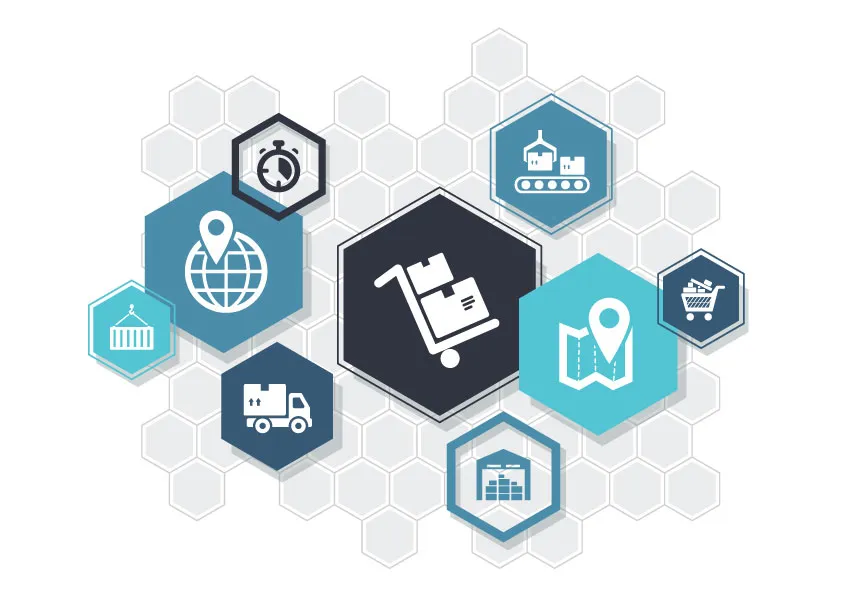Top 7 Use Cases of Machine Learning in Supply Chain Industry
Machine Learning is a complex yet interesting subject that can solve a number of issues across industries.
Supply chain, being a heavily data reliant industry, has many applications of machine learning. Elucidated below are top 7 use cases of machine learning in supply chain management which can help drive the industry towards efficiency and optimization.
1.Predictive Analytics
There are several benefits of accurate demand forecasting in supply chain management, such as decreased holding costs and optimal inventory levels.
Using machine learning solution models, companies can enjoy the benefit of predictive analytics for demand forecasting. These machine learning models are adept at identifying hidden patterns in historical demand data. Machine learning in supply chain can also be used to detect issues in the supply chain even before they disrupt the business.
Having a robust supply chain forecasting system means the business is equipped with resources and intelligence to respond to emerging issues and threats. And, the effectiveness of the response increases proportionally to how fast the business can respond to problems.
2.Automated Quality Inspections For Robust Management
Logistics hubs usually conduct manual quality inspections to inspect containers or packages for any kind of damage during transit. The growth of artificial intelligence and machine learning have increased the scope of automating quality inspections in the supply chain lifecycle.
Machine learning enabled techniques allow for automated analysis of defects in industrial equipment and to check for damages via image recognition. The benefit of these power automated quality inspections translates to reduced chances of delivering defective or faulty goods to customers.
3.Real-Time Visibility To Improve Customer Experience
A Statista survey identified visibility as an ongoing challenge that grapples the supply chain businesses. A thriving supply chain business heavily depends on visibility and tracking, and constantly looks for technology that can promise to improve visibility.
Machine learning techniques, including a combination of deep analytics, IoT and real-time monitoring, can be used to improve supply chain visibility substantially, thus helping businesses transform customer experience and achieve faster delivery commitments. Machine learning models and workflows do this by analysing historical data from varied sources followed by discovering interconnections between the processes along the supply value chain.
An excellent example of this is Amazon using machine learning techniques to offer exceptional customer experience to its users. Machine learning does this by enabling the company to gain insights into the correlation between product recommendations and subsequent website visits by customers. These insights make Amazon’s recommendation engine very powerful and effective in driving up their revenue.
4.Warehouse Management
Efficient supply chain planning is usually synonymous with warehouse and inventory-based management. With the latest demand and supply information, machine learning can enable continuous improvement in the efforts of a company towards meeting the desired level of customer service level at the lowest cost.
Machine learning in the supply chain with its models, techniques and forecasting features can also solve the problem of both under or overstocking and completely transform your warehouse management for the better.
Using AI and ML, you can also analyse big data sets much faster and avoid the mistakes made by humans in a typical scenario.
5.Reduction in Forecast Errors
Machine Learning serves as a robust analytical tool to help supply chain companies process large sets of data.
Apart from processing such vast amounts of data, machine learning in supply chain also ensures that it is done with the greatest variety and variability, all thanks to telematics, IoT devices, intelligent transportation systems, and other similar powerful technologies. This enables supply chain companies to have much better insights and help them achieve accurate forecasts. A report by McKinsey also indicates that AI and ML-based implementations in the supply chain can reduce forecast errors up to 50%.
6.Advanced Last-Mile Tracking
Last-mile delivery is a critical aspect of the entire supply chain as its efficacy can have a direct impact on multiple verticals, including customer experience and product quality. Data also suggests that the last mile delivery in the supply chain constitutes 28% of all delivery costs.
Machine learning in supply chain can offer great opportunities by taking into account different data points about the ways people use to enter their addresses and the total time taken to deliver the goods to specific locations. ML can also offer valuable assistance in optimising the process and providing clients with more accurate information on the shipment status.
7.Fraud Prevention
Machine learning algorithms are capable of both enhancing the product quality and reducing the risk of fraud by automating inspections and auditing processes followed by performing real-time analysis of results to detect anomalies or deviation from normal patterns.
In addition to this, machine learning tools are also capable of preventing privileged credential abuse which is one of the primary causes of breaches across the global supply chain.
#artificial intelligence and machine learning #ml #supplychain-automation #machine-learning #artificial-intelligence
